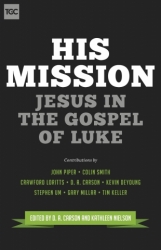For a fuller review and to enter to win a FREE copy of His Mission from Crossway, visit here.
This new work is a truly pleasure to read and an excellent source of pastoral exposition and application of Luke’s Gospel. Contributors include John Piper on Luke 1-2, Colin Smith on the sermon at Nazareth (Luke 4:14-30), Crawford Loritts on Jesus’ power toward the afflicted (Luke 8:26-56), D. A. Carson on Jesus’ resolve to head toward Jerusalem (9:18-62), Kevin DeYoung on Jesus’ mission to save the lost (Luke 15:1-32), Steven Um on Jesus and money (16:1-15), Gary Millar on Jesus’ betrayal and crucifixion (22:39-23:49), and Tim Keller on Jesus’ vindication in Luke 24.
There are several highlights in this work to be taken as models for excellent preaching. In the first sermon of the book on Jesus in Luke 1-2, John Piper begins with an empassioned (even though a written medium) exposition of the word “asphaleion” (certainty). This first point of the sermon makes a good illustration of how to undertake a proper word study. He does the same with “Most Excellent” as the title of Theophilus, which is the same title used for Felix and Festus later in the book. “It is dangerous to be a “most excellent” anything, Piper conclues. This shows the benefits of mastering the content and flow of an entire biblical book before preaching from it. The term “Most Excellent” might lead one to believe Theophilus is pious, but later use of the title suggests perhaps he was only interseted enough to hear about Christ, but not yet to accept him as Lord.
Kevin DeYoung’s sermon was engaging and illustrative, using humorous family dialogue and weaving in hymns. Stephen Um’s sermon models sensitivity to biblical theology by emphasizing Luke’s special concerns for money and the poor. He leads the listener (reader) to see that the power to free us from the grip of money comes only from security in Christ and being mastered and loved by him. Colin Smith’s sermon was a model of clarity and organization, as he walked slowly through the text explaining the historical setting, the meaning of the passage, and the OT background of Jubilee. Lastly, all the sermons strove to be centered on Christ to draw the audience into worship of the Lord.
The conference panel recorded at the end is probably the most intellectually stimulating part of the book, in which Keller, Piper, and DeYoung discuss the question “Did Jesus preach the Gospel,” moderated by D. A. Carson. The central issue is whether Jesus preached the kingdom and Paul preached the gospel of individual justification in the sense that these are two distinct ideas. If so, which takes precedence? Those that see a distinction between the two ideas generally hold that Jesus’ message of the kingdom should be the lens through which we read Paul’s message of individual salvation, or that Jesus should simply be listened to over again Paul. The conference panel discussed various aspects of this question and the results were interesting. I have discussed it in a bit more detail here and will leave the reader to find more at his or her discretion.
Also, don’t forget that Crossway has generously provided one free copy of the book: enter here to win.
